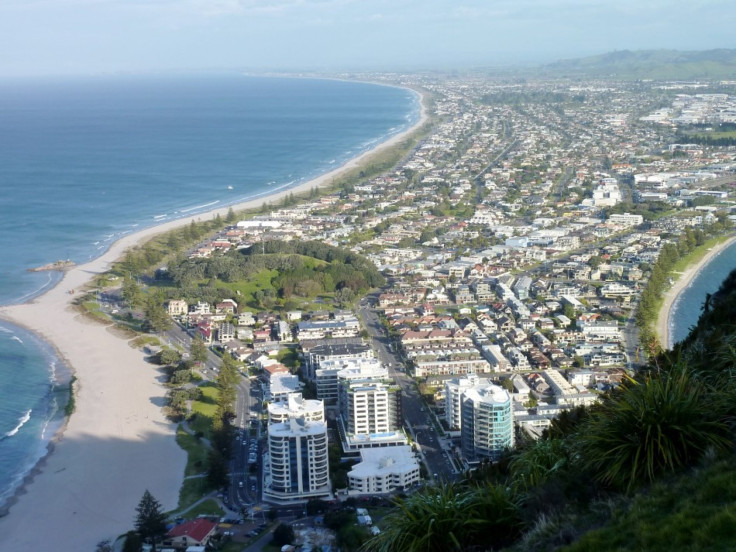New Zealand Oil Spill Tainting Nation’s ‘Pure’ Image for Tourists

New Zealand prides itself on its 100 percent Pure marketing campaign. So what happens when a 775-foot cargo ship taints the nation's beaches with globs of toxic black oil?
The New Zealand oil spill has become a major headache for the island nation and things are getting significantly worse.
This event has come to a stage where it is New Zealand's most significant maritime environmental disaster, Environment Minister Nick Smith said to the growing media in Tauranga.
The government is determined to throw everything possible at minimizing the environmental harm of what is now clear to be New Zealand's worst environmental disaster in many decades.
Residents of the popular beach towns of Mount Maunganui and Papamoa are bracing for an ecological catastrophe. They have been warned to stay away from the shore and not touch the heavy globs of oil, which authorities say are toxic.
Meanwhile, tourism operators across New Zealand watch nervously, worried that these disaster images of blackened beaches and oil-slicked wildlife may tarnish the nation's clean green image.
It's that very image that the nation uses to market itself to the world - and it seems to be working. New Zealand is one of the world's biggest tourism destinations and it drew over 2.5 million tourists in 2010. Tourism contributes nearly 9 percent of the nation's GDP and directly supports 5 percent of the total workforce.
How does a nation whose award-winning 10-year campaign 100 Percent Pure New Zealand combat an environmental disaster of this magnitude?
Mind you, the disaster had nothing to do with New Zealand, other than the fact that the ship happened to crash into a well-known reef in calm waters a few miles off the coast in the Bay of Plenty.
Now, it really is the Bay of Plenty. Yet, what's plentiful is less than desirable.
This container oil spill could bankrupt New Zealand, Kip Brook, director of Word of Mouth Media NZ, told International Business Times. It has been 100 percent Pure for years. Now it's 100 percent pure oil.
New Zealand's pristine reputation has been irrevocably shattered, Brook added. It has overshadowed the current Rugby World Cup tournament and will impact next month's general elections. This is too large an event for a country of just 4.5 million already reeling from Christchurch's earthquakes, which have claimed 181 lives, ruined the city, and cost up to $40 billion.
Officials say that some 350 tons of oil has leaked from the Liberia-flagged, Rena, which ran aground on the Astrolabe Reef, just off the Port of Tauranga, last Wednesday.
Hundreds of concerned Kiwis (the people, not the birds) are combing the beach for oil-slicked birds and removing the toxic globs of oil.
Authorities warn that the crisis will take weeks or months to tackle, rather than days. With 1,700 tons of oil onboard - and fuel continuing to leak from the vessel - this is a disaster that will linger, both on shore, and in people's minds.
That's what tourism officials are concerned about - this tarnished image of the pure nation. A nation that prides itself on its exotic birds, is now faced with images of their oily deaths.
Images of frolicking whales and dolphins in the Bay of Plenty feature prominently in Tourism New Zealand's campaign. Their Web site now has a link for Information about Tauranga that states:
Oil has leaked [from Rena] and some of it has washed up on a number of local Tauranga beaches. The size of the affected area in the Bay of Plenty is small in the context of New Zealand's overall size and 15,000 km coastline. Intending visitors are advised to continue with their plans to travel around New Zealand.
Glenn Ormsby, the General Manager of the Tauranga-based Tourism Bay of Plenty, echoed that sentiment.
The Rena incident has impacted a narrow and contained stretch of our coastline and the management of the container ship and beach clean-up operations are in full swing and being supported strongly by both the local community and visitors to the region, Ormsby told International Business Times on Friday.
We are buoyed by the news that 1000 people hit the beaches today and more than 95 tons of solid waste has been collected from the beaches so far, he added.
Though positive about the reaction and cleanup efforts, Ormsby noted that the sea is intrinsically tied to the tourism industry in the region.
The coast and the ocean are extremely important to tourism in the area, he said. A significant number of our tourism and recreational activities are marine based and include operations such as dolphin watching, fishing tours and alike.
In the short term, many businesses are actually seeing a boom in disaster tourism.
Our business is booming, the last week especially, Craig Cameron, owner of the popular restaurant Latitude 37 in Mount Maunganui, told International Business Times.
We have been well patronized by Media crews, salvage crews, the Navy. The cruise ships have just started back. Plus it is the first week of school holidays. Plus we are in the final two weeks of the Rugby World Cup with a lot of tourists passing through. This week, I was told in the entire Tauranga area there was only 30 beds available at Motels and Hotels, Cameron noted.
However he added that, for now, the oil spill is a big curiosity.
I have heard some people have cancelled their Christmas holidays, but most hoteliers have persuaded costumers to give it a couple of weeks before making that decision.
Like most in the region, he too is optimistic.
I believe - and talking to top clean-up crews - six to eight weeks and it will be done and gone.
© Copyright IBTimes 2024. All rights reserved.






















